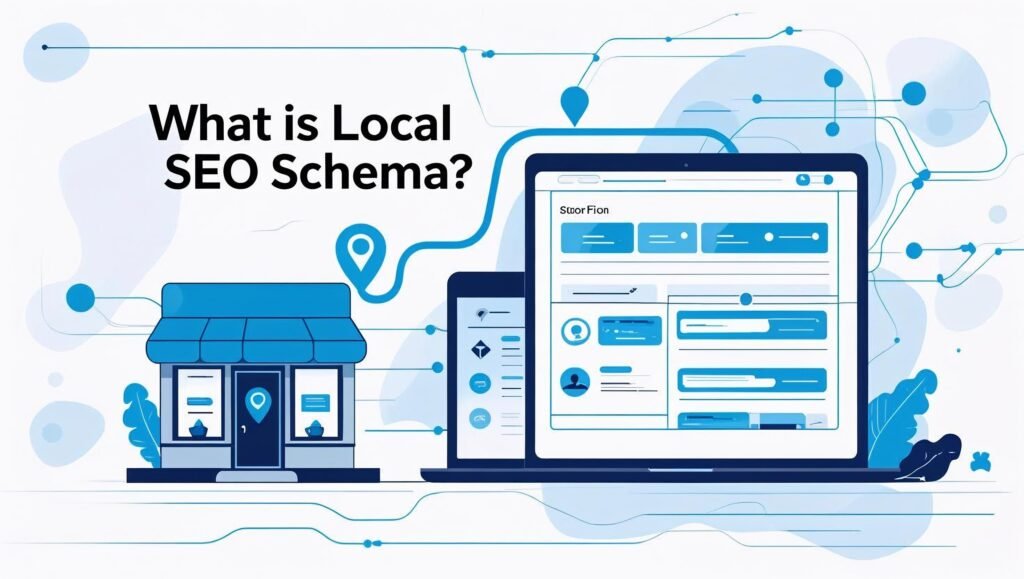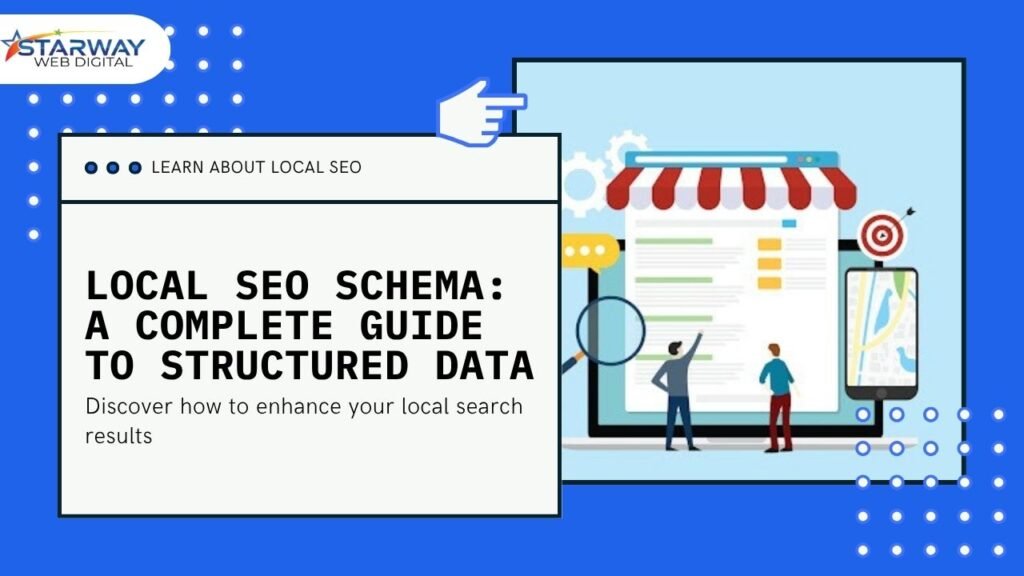If you want your local business to stand out in Google searches, simply optimizing your site for keywords isn’t enough. You need local SEO schema—a powerful type of structured data that helps search engines fully understand your business, showcase you in rich results, and attract more customers from your area.
In this guide, you’ll learn exactly what local SEO schema is, why it matters, how it works, and how to implement structured data for the best results.
What is Local SEO Schema?

Local SEO schema is a specialized structured data markup (also called “schema markup”) you add to your website’s code. It tells Google and other search engines detailed facts about your business—like your name, address, hours, reviews, and much more—in a standardized way that’s easy for their algorithms to process.
Think of it as a translator: it turns your business details into a format search engines quickly understand, so they show your most important info directly in local search results, Google Maps, and even AI- and voice-powered searches.
Why Use Local Structured Data?
Implementing local SEO schema does more than just make you look good in searches:
- Rich Results in SERPs: Your business listing can display star ratings, business hours, photos, menus, and more—driving higher click-through rates and making you stand out over competitors.
- Enhanced Local Pack & Maps Visibility: Proper markup increases your chances of showing up in the local 3-pack and map results.
- Faster Customer Decisions: People can find reviews, location, services, and even booking buttons right from the search page.
- Voice Search & AI Optimization: Voice assistants and AI tools like Google Assistant rely heavily on structured data to answer “near me” queries and provide instant details.
- Builds Trust & User Experience: When users see accurate, detailed info in search, they’re more likely to choose your business.
For more fundamental local SEO strategies, don’t miss our guide on hyper-local SEO for local businesses.
How Does Local SEO Schema Work?

Google recognizes several types of local SEO schema, but the most important is the LocalBusiness type from Schema.org. This schema lets you specify:
- Business name, address, phone (NAP)
- Opening hours (including holidays)
- Website, logo, and images
- Customer reviews and aggregate ratings
- Service areas and geo-coordinates
- Menu links, booking/reservation options, product listings
All this info is added in a format called JSON-LD (JavaScript Object Notation for Linked Data), which sits invisibly in your page’s HTML code and is easily read by search engines.
Core Properties for LocalBusiness Schema
To maximize your rich results with local SEO schema, include these essential properties:
@type: “LocalBusiness” (or a more specific type, e.g., “Restaurant”)nameaddress(include full postal address)telephoneopeningHoursurlimage/logogeo(latitude and longitude)reviewandaggregateRating(if you display reviews)sameAs(links to your official social profiles)areaServed(service area zip codes)hasMap(Google Maps URL)- Optionally,
menu,department, andpriceRange
Step-by-Step: How to Implement Local Business Schema
- Choose the Correct Schema Type:
Start withLocalBusinessor a more precise category (e.g.,Plumber,Restaurant).
For more examples, see our advice for local plumbers and restaurants. - Generate Your Schema Markup:
Use tools like Google’s Structured Data Markup Helper or JSON-LD generators to build your code. - Add the JSON-LD to Your Website:
Paste the generated code into the<head>tag or just before the closing</body>tag of your local business landing pages. - Validate Your Markup:
Always test with Google’s Rich Results Test to catch errors before publishing live. - Keep Data Updated & Consistent:
Make sure your business details in schema exactly match those on your website and your Google Business Profile.
Local SEO Schema Best Practices
- Use as specific a schema type as possible (e.g.,
Dentist,Bakery,Hotel) - Include all core properties plus extras like reviews, price range, and booking URLs
- Mark up only content that users can see on your page (don’t fake reviews or services)
- Use the same NAP across your schema, website, and business listings
- Regularly revalidate your structured data when making site changes
Common Questions
Does schema markup boost rankings?
While it’s not a direct ranking factor, schema boosts visibility, click-throughs, and provides more info to Google, all of which can drive more organic traffic.
Can I add LocalBusiness schema if I’m a service-area business?
Yes, use properties like areaServed and ensure you specify your coverage area in schema.
How do I stand out vs. competitors?
Rich results, like FAQs and reviews, make your business pop in local search, giving you the edge in crowded markets.
Conclusion and Boost Your Local SEO with Starway Web Digital
Local SEO schema is one of the most powerful, underused tools for dominating local search. By implementing structured data, your business is easier to find, your search listings look more professional, and you’re ready for the future of search with AI and voice devices.
However, executing effective local SEO schema markup and building a comprehensive local SEO strategy requires expertise and consistent effort. This is where Starway Web Digital comes in. We specialize in empowering local businesses with innovative SEO solutions tailored to your specific needs.
Our team helps you implement advanced structured data, optimize for rich results, and create effective local SEO campaigns that get your business found faster by the right customers. Whether you’re a small shop or a multi-location enterprise, our hands-on support and data-driven insights ensure your business climbs local search rankings and converts visibility into loyal customers.
Ready to elevate your local SEO and gain a competitive advantage? Visit StarwayWebDigital.com today and discover how our expert services can help you dominate local search and grow your business with confidence.
For more hands-on local SEO tips, explore our related blogs on:
Stay ahead of the competition—let local SEO schema power up your search presence!




